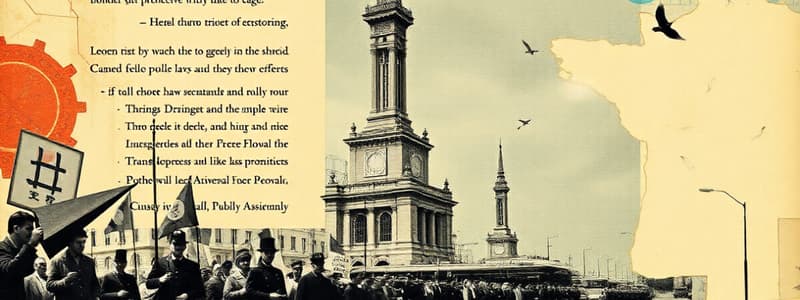Podcast
Questions and Answers
Under what circumstances can the Area Officer refuse to grant a permit for a procession or assembly?
Under what circumstances can the Area Officer refuse to grant a permit for a procession or assembly?
- If the Area Officer has prior experience with similar events.
- If the Area Officer receives complaints from nearby residents.
- If the event has not been authorized by any local organizations.
- If the Area Officer believes it will lead to serious public disorder. (correct)
What must the Commissioners Area Officers comply with?
What must the Commissioners Area Officers comply with?
- Public opinion regarding assemblies and processions.
- General or special directions from the Governor. (correct)
- Recommendations from community leaders.
- The preferences of local law enforcement agencies.
What authority does the Governor hold regarding assemblies or processions?
What authority does the Governor hold regarding assemblies or processions?
- To approve all permits without conditions.
- To delegate the permit approval process to local authorities.
- To grant permits based solely on personal preference.
- To prohibit any assembly or procession if it affects public safety. (correct)
What action can the Governor take concerning specific classes of assemblies or processions?
What action can the Governor take concerning specific classes of assemblies or processions?
Which of the following actions does NOT fall under the powers granted to the Commissioner?
Which of the following actions does NOT fall under the powers granted to the Commissioner?
What must a person do before organizing an assembly or procession in a public place?
What must a person do before organizing an assembly or procession in a public place?
What conditions may the Area Officer impose when granting a permit for a procession?
What conditions may the Area Officer impose when granting a permit for a procession?
If the Area Officer believes an assembly may prejudice good order, what action can they take?
If the Area Officer believes an assembly may prejudice good order, what action can they take?
In which situation can the Area Officer issue special conditions along with the permit?
In which situation can the Area Officer issue special conditions along with the permit?
What does the term 'Commissioner' refer to in the amended ordinances post-07 March 2005?
What does the term 'Commissioner' refer to in the amended ordinances post-07 March 2005?
What must be true for a procession to be considered unlawful according to the provided legal provisions?
What must be true for a procession to be considered unlawful according to the provided legal provisions?
Which of the following scenarios would NOT lead to the dispersal of a gathering?
Which of the following scenarios would NOT lead to the dispersal of a gathering?
What does section 5A suggest about the purpose of organized assemblies?
What does section 5A suggest about the purpose of organized assemblies?
Who has the authority to stop an assembly according to the legal provisions stated?
Who has the authority to stop an assembly according to the legal provisions stated?
What are the consequences of neglecting or refusing to obey a dispersal order under section 6?
What are the consequences of neglecting or refusing to obey a dispersal order under section 6?
What types of gatherings are explicitly mentioned as needing a permit to be lawful?
What types of gatherings are explicitly mentioned as needing a permit to be lawful?
Which of the following would be considered a valid reason for imposing conditions on an assembly?
Which of the following would be considered a valid reason for imposing conditions on an assembly?
What is defined as an unlawful assembly under these provisions?
What is defined as an unlawful assembly under these provisions?
Flashcards are hidden until you start studying
Study Notes
Legislative Changes
- Ordinance 6/2005 introduced changes, effective from 7 March 2005, including the insertion of subsection (6) and the repeal and replacement of Section 5.
Conditions for Assemblies and Processions
- Assemblies or processions may be regulated if they threaten:
- Serious public disorder
- Significant property or environmental damage
- Major disruption to community life
- Organizers’ intentions to commit unlawful acts or intimidate others may also lead to prohibitive action.
Authority to Disperse Unlawful Gatherings
- The Commissioner or authorized officers can halt any procession without a permit or contravening permit conditions.
- Assemblies without proper permits can be ordered to disperse under similar terms.
Definition of Unlawful Assemblies
- An assembly of five or more persons or a procession of five or more persons or three or more vehicles becomes unlawful if:
- It occurs in a public space without a permit
- It violates the conditions of a permit
- It fails to comply with dispersal orders
Permit Application Process
- Organizers must apply for a permit to hold assemblies or processions, detailing:
- The purpose, route, and timing for processions
- The place, purpose, and timing for assemblies
- The Area Officer has discretion to grant or deny permits based on public order considerations.
Cancellation of Permits
- The Commissioner can cancel or modify permits at the direction of the Governor.
Prohibition of Assemblies
- The Governor can issue orders to prohibit assemblies or processions in the interest of public order or safety, targeting specific types of gatherings or certain time periods.
Circumstantial Authority
- If an Area Officer believes local conditions may lead to public disorder, they possess the authority to deny permit applications for proposed assemblies or processions.
Studying That Suits You
Use AI to generate personalized quizzes and flashcards to suit your learning preferences.




